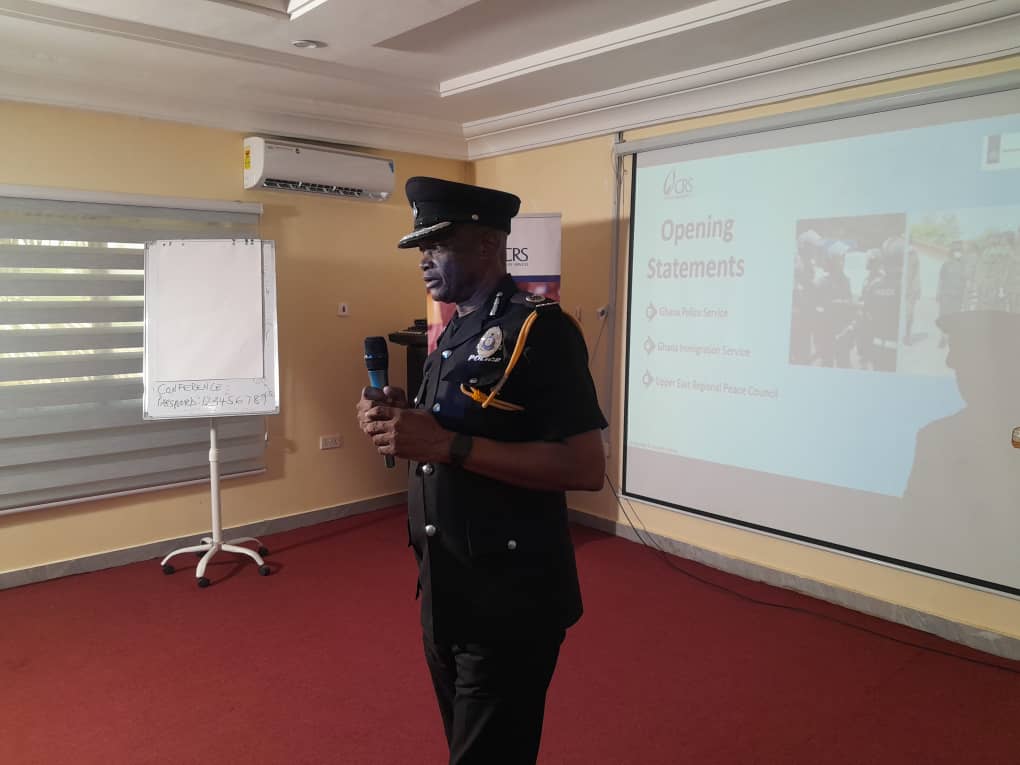Young people must understand they bear full responsibility for their actions, even when those actions are unintended, a senior police officer warned during a training session aimed at preventing violent extremism in northern Ghana.
ACP Joseph Darison Wusi, Deputy Upper East Regional Commander of the Ghana Police Service, emphasized the critical importance of personal accountability while addressing 40 carefully selected youth participants at a two-day training organized by Catholic Relief Services and its partners in Bolgatanga.
“Whatever you do on this earth, you are responsible for whatever choice you make,” ACP Wusi told the gathering, part of the Prevention of Violent Extremism through Social Accountability (PoVETSA) Phase II project.
The officer illustrated his point with a stark example: a simple altercation between friends that escalates to tragedy. “If your friend insults you and you become angry, or he knocks you and you become angry and retaliate, and you push him or her, and they fall and become unconscious, before you realize that your friend is dead,” ACP Wusi said. “That pushing, you are accepting responsibility. It’s a crime. It’s a murder.”
The warning comes as Ghana works to inoculate its northern regions against violent extremism spreading from the Sahel, where neighboring countries including Burkina Faso, Benin, Côte d’Ivoire, and Togo have experienced attacks.
The PoVETSA project, implemented by Catholic Relief Services in partnership with the National Peace Council and Kofi Annan International Peacekeeping Training Centre, is addressing root causes of radicalization across five northern regions: Upper East, Upper West, North East, Northern, and Savannah. The initiative is funded by the Kingdom of the Netherlands.
Youth unemployment has been identified as the most common driver of violent extremism in northern Ghana, making young people particularly vulnerable to recruitment by extremist groups. The training aims to equip participants with skills to detect and prevent radicalization while understanding the legal and moral consequences of their choices.
“When you are disciplined in thought, that anger, that’s what police, in policing, you can find a lot of people insulting individuals who keep quiet, because they’re disciplined in thought,” ACP Wusi explained, contrasting the measured response of trained personnel with impulsive civilian reactions.
The officer’s emphasis on responsibility and discipline aligns with PoVETSA’s broader goal of building social cohesion and trust between civilians and security services. The project recognizes that preventing violent extremism requires not only security interventions but also addressing underlying social issues including political intolerance, marginalization, farmer-herder conflicts, and substance abuse.
The 40 youth participants were carefully selected from communities across the Bolgatanga Municipality to serve as peace champions and early warning sentinels in their localities. Their training covers conflict resolution, human rights, detection of radicalization signs, and mechanisms for reporting suspicious activities to security agencies.
“The goal is to improve trust relations between civilians and security services for the prevention of violent extremism, and that goal is very important,” ACP Wusi said, outlining how the police service’s hierarchical structure—from street-level officers to the Inspector General of Police—provides multiple access points for citizens seeking assistance.
Beyond law enforcement, the PoVETSA project has included, in the past, training for 150 security personnel on the “Responsibility to Protect” doctrine, focusing on preventing mass atrocity crimes including genocide, war crimes, ethnic cleansing, and crimes against humanity. It has also conducted regional stakeholder dialogues, women’s empowerment programs, and media training on preventing violent extremism.
The initiative operates on a three-level prevention strategy: addressing long-term governance and economic factors, providing real-time crisis relief, and building post-crisis resilience and stability.
Source: a1radioonline.com|101.1Mhz|Mark Kwasi Ahumah Smith|Bolgatanga


